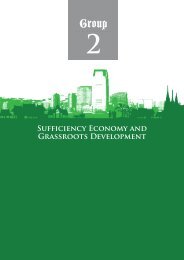Conflict, Legitimacy and Government Reform: Equitable Allocation of ...
Conflict, Legitimacy and Government Reform: Equitable Allocation of ...
Conflict, Legitimacy and Government Reform: Equitable Allocation of ...
You also want an ePaper? Increase the reach of your titles
YUMPU automatically turns print PDFs into web optimized ePapers that Google loves.
Panel Discussion<br />
Hyun Hwa Son’s study also suggested that Thai government should<br />
revamp public expenditure to increase equality. For instance, he proposed<br />
that existing subsidies <strong>of</strong> electricity, water <strong>and</strong> transportation should be<br />
abolished. Instead, the government should subsidize parents’ school<br />
expenses, i.e. tuition, books <strong>and</strong> other education-related expenses in<br />
public schools at primary <strong>and</strong> secondary levels. He also urged that health<br />
care <strong>and</strong> education spending be revamped with an aim to improve<br />
equality. In this regard, the free 12-year education policy <strong>of</strong> the present<br />
government is considered to be on the right track, even though it is still<br />
insufficient.<br />
Based on experiences <strong>of</strong> some countries, there is still another way to<br />
spend tax revenue to help improve quality <strong>of</strong> life <strong>and</strong> mitigate inequality,<br />
that is, having a universal social security system which is contributed by<br />
both government <strong>and</strong> people. Currently, we use this system for workers<br />
but its coverage is only 25.7% <strong>of</strong> the total number <strong>of</strong> workers or 13.9%<br />
<strong>of</strong> the population. (Kobsak <strong>and</strong> Anan, 2007).<br />
We may discuss about weaknesses <strong>of</strong> public administration in other<br />
dimensions which adversely impacts resource allocation <strong>of</strong> the country,<br />
such as issues concerning corruption <strong>and</strong> justice system <strong>and</strong> so forth.<br />
However, the information shown above obviously tells us that we must<br />
have a sweeping reform, starting from revamping taxation system to<br />
ensure a fairer allocation <strong>of</strong> tax burden <strong>and</strong> revamping public expenditure<br />
to enhance equality.<br />
Now I would like to summarize the approaches that the government<br />
should pursue as follows:<br />
First, there should be more public programs <strong>and</strong> services (public<br />
goods) that every people can gain equal benefits <strong>and</strong> public goods should<br />
be products <strong>and</strong> services that will contribute to mitigation <strong>of</strong> inequality<br />
in respect to health <strong>and</strong> education in particular. To achieve this, the<br />
government must collect more tax revenue. Therefore, a target <strong>of</strong> over 17<br />
per cent <strong>of</strong> GDP should be set to generate more tax revenue in the<br />
future. That means increasing the number <strong>of</strong> people who must pay<br />
income tax, revamping interest rate tax which is still slow, <strong>and</strong> reforming<br />
59














